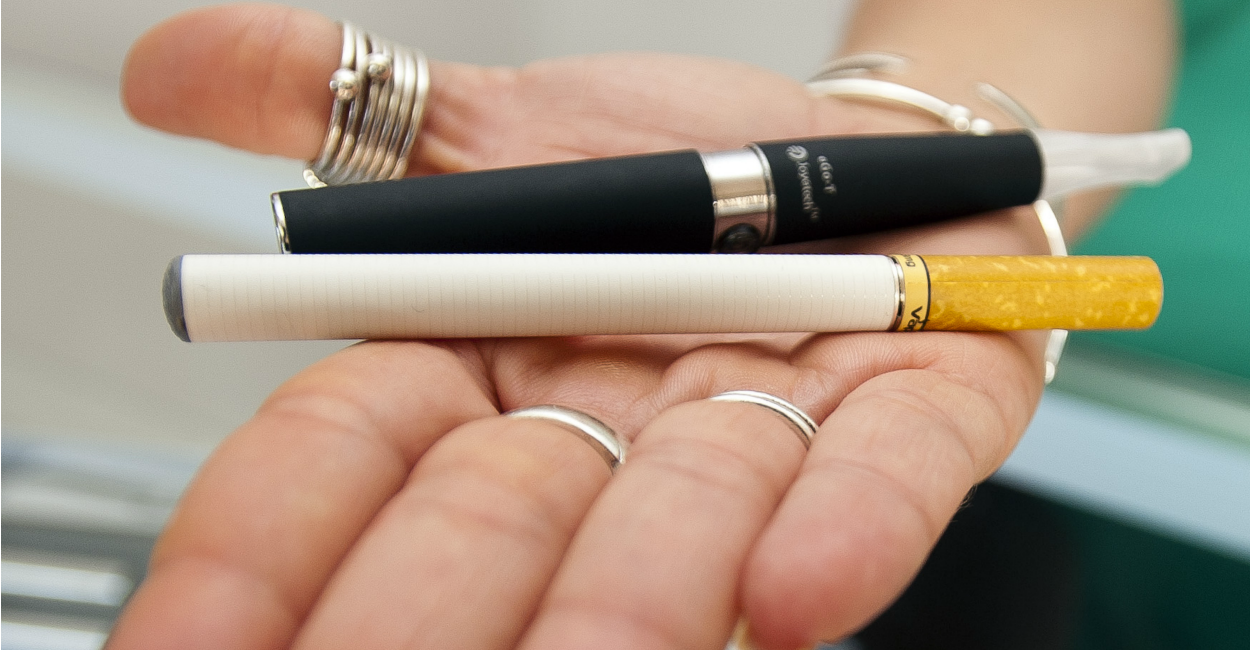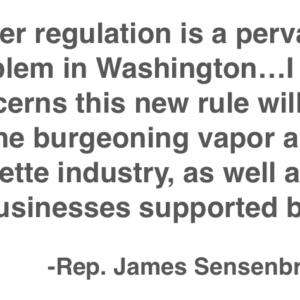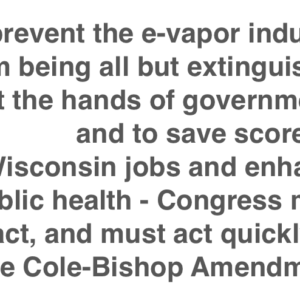
November 17, 2016
By Chris Rochester
MacIver Institute Communications Director
New federal regulations on e-cigarettes, products that replace traditional cigarettes with a less-harmful vapor alternative, could sweep away the budding e-cig industry and many Wisconsin jobs if Congress doesn’t act soon on a bipartisan fix.
The e-vapor industry – also known as the vaping or e-cig industry – will be required to go through an extremely expensive and complex FDA approval process to keep their products on the market. The application process will be foisted on upwards of 99 percent of the industry. The industry is made up of many small companies that are likely to fold without Congressional action.
One of those small businesses is Johnson Creek Vapor Co. of Hartland, Wis. On its website the company describes itself as America’s first producer of e-liquid, the nicotine-containing fluid that is converted to vapor in e-cigarettes. The company is currently the second largest e-liquid manufacturer in the world, according to their website.
That’s in addition to numerous small “vape shops” that sell e-cigarette products throughout Wisconsin and the country.
Congressman James Sensenbrenner, the dean of Wisconsin’s congressional delegation, represents Johnson Creek and has expressed concern over the new rule. “Over regulation is a pervasive problem in Washington,” said Sensenbrenner. “I have concerns this new rule will hurt the burgeoning vapor and e-cigarette industry, as well as the businesses supported by it.”
As part of its new raft of regulations on e-vapor, the FDA sets February 15, 2007 as the “predicate date” for the new rules. In other words, any new products that entered the market after that date will be subject to the stringent new requirements, including the byzantine approval process and massive costs.
Since the e-vapor market was still in its infancy on that date nearly a decade ago – and since most of the industry’s advancements have taken place since then – nearly all e-vapor products will be subjected to the new burdensome approval regime. It’s likely the vast majority of companies in the e-vapor market will be out of business within three years.
Further, since most traditional combustible cigarettes were already on the market on February 15, 2007, manufacturers of traditional cigarettes will essentially be grandfathered, protected from the new rules. The rules will therefore protect traditional cigarettes while snuffing out the e-vapor industry.
This should concern those of us interested in protecting jobs, but it should also concern public health advocates. Growing evidence shows that e-cigarettes are considerably less harmful than traditional cigarettes. An August 2015 study by Public Health England, an agency of England’s Department of Health, found e-cigarettes are 95 percent less harmful than combustible cigarettes.
The study also found that most of the chemicals that cause smoking-related diseases are absent from e-vapor and that e-cigarettes release negligible levels of nicotine into ambient air. Many smokers have also quit the deadly habit by switching to vaping.
Regardless of the mounting evidence that e-vapor is considerably less harmful, it’s undisputed that traditional combustible cigarettes are extremely harmful to users’ health – particularly the tar that the combustion of the tobacco produces. E-cigarettes don’t involve combustion of tobacco.
How can Congress prevent the e-vaping industry from being extinguished?
One amendment to the 2009 law enabling the FDA’s new rules, the Cole-Bishop Amendment, would change the predicate date from February 15, 2007 to the date the final regulations were adopted – August 8, 2016 – putting e-cigs on the same regulatory footing as traditional cigarettes. The FDA claims it doesn’t have the authority to change this date without an act of Congress.
The bipartisan Cole-Bishop Amendment also addresses some concerns that the current regulations do not, including battery safety, labeling requirements, and restrictions to prevent sales to youth.
To prevent the e-vapor industry from being all but extinguished at the hands of government – and to save scores of Wisconsin jobs and enhance public health – Congress must act, and must act quickly on the Cole-Bishop Amendment.

